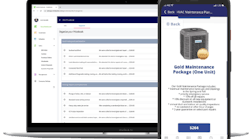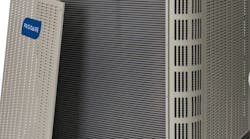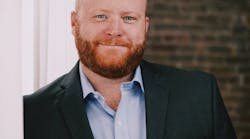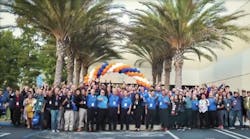With eight branch locations covering all or portions of five Midwest states, no one in the industry can consider the O'Connor Co. a “mom-and-pop” wholesaler. But president Lynn Piller says this family-owned operation, based in Lenexa, KS, continues to maintain the friendly feel of a small business while providing the products, services and assistance of a large HVACR wholesaler. While these qualities may seem mutually exclusive, O'Connor customers are truly getting the best of both worlds.
Piller's grandfather, Joe O'Connor, started the O'Connor company in 1921 in Wichita, KS. The O'Connor Co. thrived because Joe found a niche in providing customers with the technical expertise that was needed at the time in that area of the country. The O'Connor Co. mechanical engineers assisted in laying out jobs, which made them such a valuable resource. O'Connor expanded the business into Oklahoma, opening a branch in Oklahoma City in the early 1930s and one branch in Tulsa in 1934. The construction boom that followed World War II boosted the O'Connor Co.'s business, and O'Connor's son-in-law, Bob Piller, joined the company in 1949 to build its growing forced air heating and air conditioning side of the business. Lynn Piller, Bob's son, joined the company in 1979 and became president in the late 1980s.
Today, the O'Connor Co. focuses on the country's heartland with branches in Tulsa, Wichita, Omaha, NE, Des Moines, IA, and four in the Kansas City area. They sold the Oklahoma City branch in 1980. In 1988, the company took on the Trane product line, which created an opportunity to take over distribution in Omaha, Des Moines and Kansas City two years later. The J.M. O'Connor Co. is a separate but related company that serves as a manufacturer's rep company for moving air, steam or water and a distribution center for Taco pumps.
As it has grown over the years, Piller says the company has always looked for ways to best service its customers. When the company first established a presence in Des Moines, it utilized a public warehousing facility, which is how Trane had run its operation there. By 1999, however, Piller realized that its growing customer base in that market would be better served by an actual retail location. “To serve the market better, we needed to have more of a presence there. A public warehouse is not a customer-friendly way to sell air conditioning,” Piller says. “If we were ever going to do well in that market, we needed to invest in it.” There was such growth at its Des Moines location that, five years later, the company doubled the size of its facility there.
With so much distance between the branches and differences among the markets themselves, each branch had historically operated autonomously. “It was like a lot of separate companies,” Piller says. “I would travel among them and be the glue that bound them together.” But Piller and his management team gradually realized that a larger company could no longer operate as eight separate branches. For example, vendors found it difficult to get all the branches to embrace the same products or initiatives. So this year, the company centralized some of its management functions. Most O'Connor Co. customers would probably notice few, if any, changes. But internally, the centralization has allowed O'Connor Co. employees to better focus on sales and to service the customer.
The centralization has worked well because Piller brought his branch managers to the table to mine their collective wisdom. “We got everybody in on the transition, and we all worked together,” he says. “Everybody has good ideas, and sometimes you work through different opinions. You get to a better place that way rather than having one person command from on high.” The key was that everybody within the company was working toward the same goal: becoming a larger organization but maintaining the local feel. Says Piller, “We don't want to be a monolith; the stores don't all have to look the same way. But we want to have them continuing to feel friendly and customer-focused.”
Coordinating the sales functions was an important step in centralization, according to Piller. They created the position of corporate sales manager to unify the sales efforts among the branches. Reg Culp, a branch sales manager at one of O'Connor's Kansas City branches, was the easy choice for the new position because he was a part of the company's culture, which made the transition easier on everyone. “We've tried, wherever possible, to keep the culture the same,” he says.
Because of the large distances that separate many of the branches, O'Connor does not maintain a central warehouse, so distribution to the branches remains decentralized. O'Connor's manufacturing partners send orders directly to each branch. When it comes to ordering, the branches maintain much of their autonomy for the present, due in part to the climate differences between some of the locations that require them to order different types of products. But the branches work with Carolyn Riehle, O'Connor's purchasing manager, to streamline orders and the ordering process. “There are people in the branches that are the local contacts, and they have a sense of what's going on in the equipment side, so they are ordered remotely from the branches through the coordination with Carolyn,” Piller says.
Between the O'Connor and the J.M. O'Connor companies, there are 130 employees. Certainly not a mom-and-pop organization, but Piller regards his employees and the fact that the two companies are family-owned as major differentiators from the larger, publicly traded companies that are among his competitors. Competent employees who are committed to their customers and who have been with the company for a long time make a difference, he says. “It's my belief that companies are nothing more than people working together. And our people are very important to us; we do our best to treat them fairly.”
An example of this manifests itself in the company's bonus commission program for all of its employees. Everyone in the company receives a commission on sales, not just the sales staff. The idea for such a program came about 10 years ago when Reg Culp, who was then a branch sales manager, commented to Piller that the sales staff seemed happier and more satisfied during the most extreme weather conditions — when its heating and cooling products sold briskly, resulting in more commission income. By instituting a program throughout the company that opened commissions on all sales, Piller says everyone became more interested and motivated in taking care of the customer.
After all, Piller says, the company must always be on top of its game. There are a lot of good competitors in all of the O'Connor markets, so his challenge — and the challenge of his employees — is to consistently improve its service and value to its customers. “I feel there will always be a place for good independent wholesalers because they can be more flexible than larger companies,” Piller says. “They are very focused and dedicated to the markets they serve.” For the O'Connor Co., that means working closely with its customers — not only to sell them HVACR equipment, parts and accessories that they need to complete their jobs, but to provide them with the tools they need to be more successful in business, such as classes in business development, sales and marketing, and business management. This adds enormous value to the relationships between the O'Connor Co. and its customers.
Just as the HVACR market has evolved with the consolidation of wholesalers and the growing influence of national wholesale distribution companies, so, too, have there been large shifts among contractors and the end- users. The O'Connor Co. is working to adapt to these changes as well. Consumers, Piller says, have become much more savvy and sophisticated when it comes to the types of air handling systems that go into their homes and buildings. The contractor is no longer their sole source of information. Before consumers call in a contractor, they're more than likely to do their initial research on the Internet. It's the challenge of HVACR wholesalers like the O'Connor Co. to help their contractor clients better understand what motivates their customers. “We have to do such things as improve our marketing efforts to give our customers more sales opportunities and help them get better at closing sales,” Piller says.
The O'Connor Co. is also becoming better at marketing itself — becoming a “marketing organization,” Piller says. The company, through its marketing specialist Melissa McDonald, is taking full advantage of opportunities that its manufacturers provide, such as local advertising programs for dealers. Individual branches previously handled marketing, but a new, unified approach is creating a better brand identity for the company. The company also works with a local advertising agency. Giving marketing more prominence in the organization reflects the fact that “business doesn't come to you. You have to earn it,” Piller says. And business today — the bulk of which is in the replacement market — takes much more of a focused marketing effort than selling systems for residential and new construction, he says.
The company no longer keeps mechanical engineers on staff as there were back in the days when Piller's grandfather began the company. Piller says it enjoys good working partnerships with the professional engineering firms in their markets. A field service representative in each of the branches is available to help contractor customers with troubleshooting. They'll even go to a job site if the issues can't be resolved over the telephone, Piller says. “We're still technically focused, but today you have to be more than that,” Piller says. “You've got to be a resource for them at all levels.” In addition to customer training, the O'Connor Co. works closely with its manufacturers to ensure that its employees receive training.
Piller takes pride in the company's relationships with its manufacturers. “We try hard to have good relationships and make them mutually beneficial,” he says. The O'Connor Co. was one of the first HVACR distributors Honeywell recognized as a Diamond Distributor in its Buildings division, and it recently earned Diamond status on the Residential side as well. The company maintains a presence at trade and manufacturer events to stay abreast of everything from new product lines to new marketing opportunities.
He says manufacturers increasingly have high expectations, but he understands the challenges they face. And he says the company is up to those challenges. “They're driven by the fact that they're publicly traded companies and they're operating at a very high level,” Piller says. “The biggest challenge is the high growth expectations. But if you want to represent a premium product, you have to perform, and we always do our best.”
As it moves forward, the company continues to look for new opportunities to grow its business in IAQ, controls systems and its parts and accessories sales. While Piller says he wouldn't characterize the O'Connor Co. as cutting-edge, it has certainly been nimble in navigating the often-difficult HVACR wholesaler landscape environment. The O'Connor Co. has successfully made the transition to a regional operation by continually looking at how it can become stronger and more customer-focused. “Centralizing where it makes sense but remaining flexible” continues to be the mantra of Piller and his management team.
Michael Maynard is a business writer in Providence, RI, who writes on issues related to HVAC, construction and architecture. Contact him at [email protected].
J.M. O'Connor Inc. — HVAC Manufacturer's Representative
J.M. O'Connor Inc. — 20
Residential equipment
Light commercial equipment
Parts
Accessories
Controls
Circulating pumps
Registers and grilles
Exhaust fans
Florida Heat Pump, ClimateMaster, Research Products,Mitsubishi
J.M. O'Connor Inc. — Taco, Loren Cook, Crown, Krueger, Ruskin
BEST PRACTICE
Definition and Example: Employee Incentive — Bonus Commission — After one year of employment, all employees (other than sales personnel who are already paid commission) are eligible to participate in this program. We pay them a monthly commission on the sales of the branch where they work. It can amount to more than $400 per month per person in the busiest months.
Significance: When we are busy and everyone is working really hard, everyone makes more - not just the commissioned sales personnel.
Benefits: Fosters a desire to give good customer service. Encourages employee loyalty.
Procedure: Paid just like normal sales commission — it is automatic.
People Involved: All employees who do not receive sales commission.
Timing: Monthly.
Cost: A lot, but it is worth it.
Contact: Lynn Piller, president, 913/894-8788 or visit www.oconnor-hvac.com.





